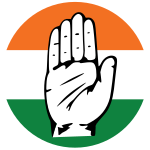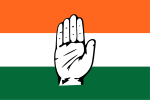ඉන්දියානු ජාතික කොන්ග්රසය
Appearance
| මෙම ලිපිය |
| ඉන්දියානු ජාතික කොන්ග්රසය |
|---|
| පිළිබඳ ලිපි මාලාවක කොටසකි |
| About |
| Committees |
| Frontals |
ඉන්දියානු ජාතික කොන්ග්රසය (ඉංග්රීසි: Indian National Congress, INC, Congress Party එසේත් නැත්නම් සරලව Congress) යනු ඉන්දියාව තුළ පිහිටි දේශපාලන පක්ෂයක් වෙයි.
ආශ්රිත ලිපි
[සංස්කරණය]- Electoral history of the Indian National Congress
- Congress Working Committee
- All India Congress Committee
- Pradesh Congress Committee
- List of presidents of the Indian National Congress
- List of Indian National Congress breakaway parties
- Nehru–Gandhi family
- List of political parties in India
- List of chief ministers from the Indian National Congress
- List of state presidents of the Indian National Congress
- ඉන්දියාවේ දේශපාලනය
- High command culture
- United Progressive Alliance
- Indian National Developmental Inclusive Alliance
මූලාශ්ර
[සංස්කරණය]සටහන්
[සංස්කරණය]උපහරණ
[සංස්කරණය]- ^ "Mallikarjun Kharge wins Congress Presidential elections, set to become first non-Gandhi head of party in 24 years - The Economic Times". Economictimes.indiatimes.com. 3 June 2021. සම්ප්රවේශය 2022-10-21.
- ^ Phukan, Sandeep (19 October 2022). "Mallikarjun Kharge wins Congress presidential election with over 7,800 votes". The Hindu.
- ^
- "Indian National Congress: From 1885 till 2017, a brief history of past presidents". Kanishka Singh. The Indian Express. 5 December 2017. සම්ප්රවේශය 28 July 2021.
- "Sagely leader: Dadabhai Naoroji". Praveen Davar. Telegraph India. 30 June 2021. සම්ප්රවේශය 28 July 2021.
- "AO Hume, 'Father' of Indian National Congress who was distrusted by the British & Indians". DEEKSHA BHARDWAJ. ThePrint. 6 June 2019. සම්ප්රවේශය 28 July 2021.
- Sinha, Arunav (28 December 2015). "Cong founder was district collector of Etawah". The Times of India. සම්ප්රවේශය 28 July 2021.
- Sir William Wedderburn (2002). Allan Octavian Hume: Father of the Indian National Congress, 1829–1912 : a Biography. Oxford University Press. p. 42. ISBN 978-0-19-565287-1.
- Kanta Kataria (2013). "A.o. Hume: His Life and Contribution to the Regeneration of India". The Indian Journal of Political Science. 74 (2): 245–252. JSTOR 24701107.
- ^ "Sonia Gandhi to chair Congress parliamentary strategy group meeting to formulate strategy for Winter Session of Parliament". ThePrint. 29 November 2022.
- ^ "Rent relief unlikely for Congress's Delhi properties". The Times of India. 4 June 2018. සම්ප්රවේශය 16 August 2018.
- ^ "Kisan and Khet Mazdoor Congress sets 10-day deadline for Centre to concede demands". The Hindu. The Hindu Group. 16 June 2016. සම්ප්රවේශය 10 March 2022.
- ^ "Southern states ahead in Congress membership drive, Telangana unit leads". ThePrint. 28 March 2022.
- ^ "Congress' Digital Membership Drive Gains Focus With Boost In Participation, South Contributes Significantly". ABP News. 27 March 2022.
- ^ a b Lowell Barrington (2009). Comparative Politics: Structures and Choices. Cengage Learning. p. 379. ISBN 978-0-618-49319-7.
- ^ Meyer, Karl Ernest; Brysac, Shareen Blair (2012). Pax Ethnica: Where and How Diversity Succeeds. PublicAffairs. p. 50. ISBN 978-1-61039-048-4. සම්ප්රවේශය 7 April 2016.
- ^ [9][10]
- ^ a b Soper, J. Christopher; Fetzer, Joel S. (2018). Religion and Nationalism in Global Perspective. Cambridge University Press. pp. 200–210. ISBN 978-1-107-18943-0.
- ^ Emiliano Bosio; Yusef Waghid, eds. (31 October 2022). Global Citizenship Education in the Global South: Educators' Perceptions and Practices. Brill. p. 270. ISBN 9789004521742.
- ^ DeSouza, Peter Ronald (2006). India's Political Parties Readings in Indian Government and Politics series. SAGE Publishing. p. 420. ISBN 978-9-352-80534-1.
- ^ Rosow, Stephen J.; George, Jim (2014). Globalization and Democracy. Rowman & Littlefield. pp. 91–96. ISBN 978-1-442-21810-9.
- ^ [13][14][15]
- ^ "Political Parties – NCERT" (PDF). National Council of Educational Research and Training. සම්ප්රවේශය 8 May 2021.
- ^ Mohan, Rakesh. (2018). India Transformed : Twenty-Five Years of Economic Reforms. Washington, DC: Brookings Institution Press. pp. 44–49. ISBN 978-0-8157-3662-2. OCLC 1056070747.
- ^ "Political Parties – NCERT" (PDF). National Council of Educational Research and Training. සම්ප්රවේශය 8 May 2021.
- ^ Jean-Pierre Cabestan, Jacques deLisle, ed. (2013). Inside India Today (Routledge Revivals). Routledge. ISBN 978-1-135-04823-5.
... were either guarded in their criticism of the ruling party — the centrist Indian National Congress — or attacked it almost invariably from a rightist position. This was so for political and commercial reasons, which are explained, ...
- ^ [19][20][9]
- ^ "Progressive Alliance Participants". Progressive Alliance. 2 March 2015 දින මුල් පිටපත වෙතින් සංරක්ෂණය කරන ලදී. සම්ප්රවේශය 20 March 2016.
- ^ "Full Member Parties of Socialist International". Socialist International.
- ^ Gabriel Sheffer (1993). Innovative Leaders in International Politics. SUNY Press. p. 202. ISBN 978-0-7914-1520-7. සම්ප්රවේශය 30 January 2013.
- ^ "Meeting of the SI Council at the United Nations in Geneva". Socialist International.
- ^ "India General (Lok Sabha) Election 2014 Results". mapsofindia.com.
- ^ "Election Results India, General Elections Results, Lok Sabha Polls Results India – IBNLive". in.com. 20 April 2015 දින මුල් පිටපත වෙතින් සංරක්ෂණය කරන ලදී.
- ^ "List of Political Parties and Election Symbols main Notification Dated 18.01.2013" (PDF). India: Election Commission of India. 2013. සම්ප්රවේශය 9 May 2013.
- ^ "Party Position in the Rajya Sabha" (PDF). Rajya Sabha. සම්ප්රවේශය 14 July 2018.
භාහිර සබැඳි
[සංස්කරණය]
විකිඋද්ධෘත සතුව පහත තේමාව සම්බන්ධයෙන් උද්ධෘත එකතුවක් ඇත:
විකිමීඩියා කොමන්ස් මේ සම්බන්ධයෙන් අදාළ මාධ්ය ඇත:
- නිල වෙබ් අඩවිය

- ඉන්දියානු ජාතික කොන්ග්රසය at Curlie
- Congress Party web resources provided by GovPubs at the University of Colorado Boulder Libraries
- Works by or about ඉන්දියානු ජාතික කොන්ග්රසය at Internet Archive
- ඉන්දියානු ජාතික කොන්ග්රසය at the Encyclopædia Britannica
ප්රවර්ග:
- ඉන්දියානු ජාතික කොන්ග්රසය
- 1885 establishments in India
- Centrist parties in India
- Centre-left parties in Asia
- Social liberal parties
- Liberal parties in India
- Social democratic parties in Asia
- Nationalist parties in India
- Indian independence movement
- Political parties established in 1885
- Progressive Alliance
- Full member parties of the Socialist International
- National political parties in India
- Member parties of the Indian National Developmental Inclusive Alliance
- ඉන්දියාව තුළ පිහිටි දේශපාලන පක්ෂ



